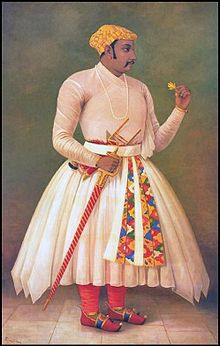Amar Singh I
| Amar Singh I | |
|---|---|
| 13th Maharana of Mewar | |

Painting of Maharana Amar Singh I by Raja Ravi Verma
|
|
| 13th Maharana of Mewar | |
| Reign | 23 January 1597 – 26 January 1620 |
| Coronation | 23 January 1597 Udaipur, Rajasthan, India |
| Predecessor | Maharana Pratap |
| Successor | Karan Singh II |
| Born |
16 March 1559 Chittorgarh Fort, Rajasthan |
| Died | 26 January 1620 (aged 60) Udaipur, Rajasthan |
| Issue |
Karan Singh II Surajmal (2/7 others) |
| House | Sisodia |
| Father | Maharana Pratap |
| Mother | Maharani Ajabde |
| Religion | Hinduism |
|
Sisodia Rajputs of Mewar II (1326–1884) |
|
|---|---|
| Hammir Singh | (1326–1364) |
| Kshetra Singh | (1364–1382) |
| Lakha Singh | (1382–1421) |
| Mokal Singh | (1421–1433) |
| Rana Kumbha | (1433–1468) |
| Udai Singh I | (1468–1473) |
| Rana Raimal | (1473–1508) |
| Rana Sanga | (1508–1527) |
| Ratan Singh II | (1528–1531) |
| Vikramaditya Singh | (1531–1536) |
| Vanvir Singh | (1536–1540) |
| Udai Singh II | (1540–1572) |
| Maharana Pratap | (1572–1597) |
| Amar Singh I | (1597–1620) |
| Karan Singh II | (1620–1628) |
| Jagat Singh I | (1628–1652) |
| Raj Singh I | (1652–1680) |
| Jai Singh | (1680–1698) |
| Amar Singh II | (1698–1710) |
| Sangram Singh II | (1710–1734) |
| Jagat Singh II | (1734–1751) |
| Pratap Singh II | (1751–1754) |
| Raj Singh II | (1754–1762) |
| Ari Singh II | (1762–1772) |
| Hamir Singh II | (1772–1778) |
| Bhim Singh | (1778–1828) |
| Jawan Singh | (1828–1838) |
| Sardar Singh | (1828–1842) |
| Swarup Singh | (1842–1861) |
| Shambhu Singh | (1861–1874) |
| Sajjan Singh | (1874–1884) |
| Fateh Singh vinjuda | (1884–1930) |
| Bhupal Singh | |
Maharana Amar Singh I, the Maharana of Mewar (16 March 1559 – 26 January 1620), was the eldest son and successor of Maharana Pratap of Mewar. He was the 13th Rana of Mewar dynasty of Sisodia Rajputs and ruler of Mewar from 19 January 1597 till his death on 26 January 1620. His capital was Udaipur
Amar Singh was the eldest son of Maharana Pratap, born to his first wife, Maharani Ajabde Panwar, who was the daughter of Rao Mamrakh Panwar. He was born in Chittor on 16 March 1559, the same year, when foundation of Udaipur was laid by his grandfather, Udai Singh II.
However, by the time he grew up, Chittor was lost to Akbar in 1567 and his grandfather, Udai Singh II had shifted capital of Mewar to Udaipur.
After his coronation, Maharana Pratap waged a war against Mughals and did not succumb to Akbar. He fought several wars with them to re-conquer Chittor and other territories lost to Mughals. Amar Singh, being eldest son, became the heir-apparent and prince or Rajkunwar.
Amar Singh was trained in military warfare and weapons since childhood. Upon growing up, he proved to be a great warrior and general and fought many wars with Maharana Pratap against Akbar.
In an incident, the womenfolk of Abdul Rahim Khan-I-Khana, along with a Mughal officer, fell into the hands of Amar Singh. He at once brought them as prisoners to Maharana Pratap. At this point of time, Khan-I-Khana was actually on the march against Pratap, and was camping at Sherpur in order to make preparations for an assault against Pratap. Nonwithstanding all this, Pratap rebuked Amar Singh for having arrested ladies of the enemy camp and commanded Amar Singh to arrange for the safe conveyance of the Mughal ladies to their camp. Khan-I-Khana was so affected by this incident that he refused to campaign against such a chivalrous monarch. He petitioned Akbar to be relieved of his post and was subsequently (in 1581) appointed guardian of Akbar's own son, Salim. Also it is believed that the slogan Jo dridh rakhe dharm, ne tahi rakhe kartar was spoken by Abdul Rahim Khan-I-Khana, who is also known as "Rahim das" in Hindi poetry.
...
Wikipedia
